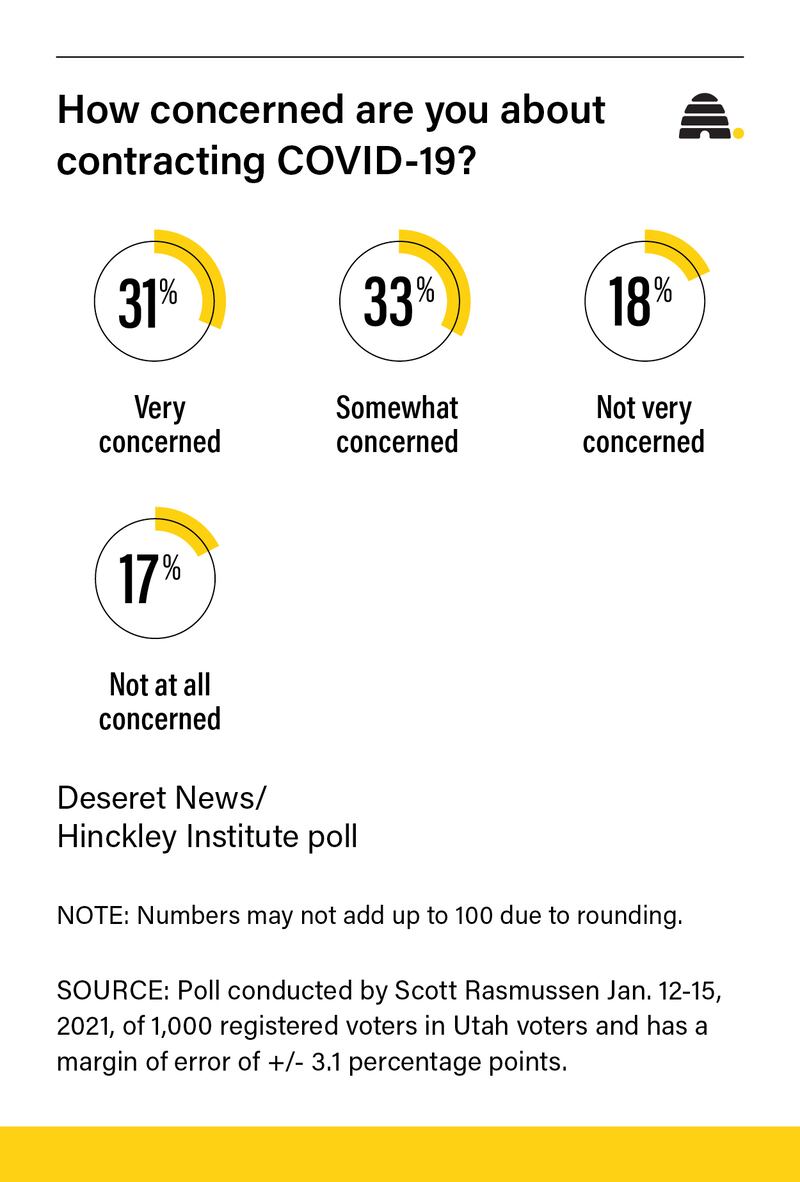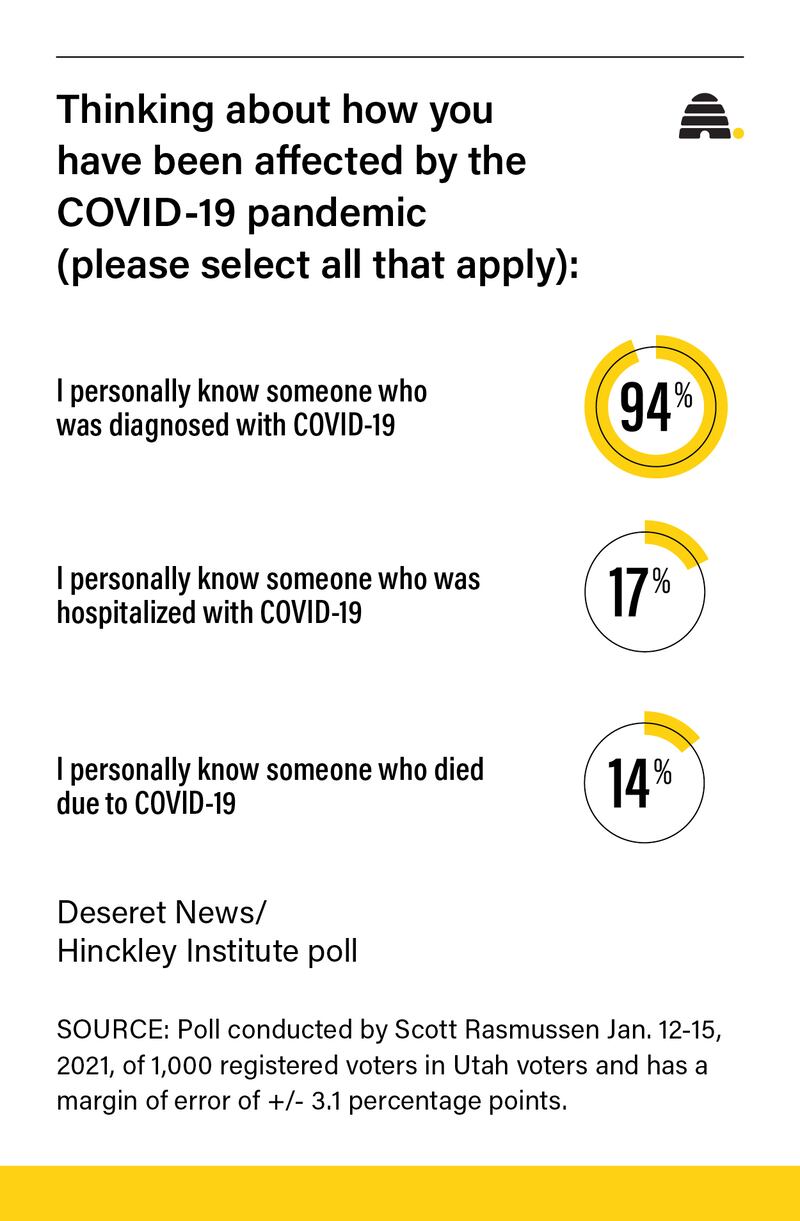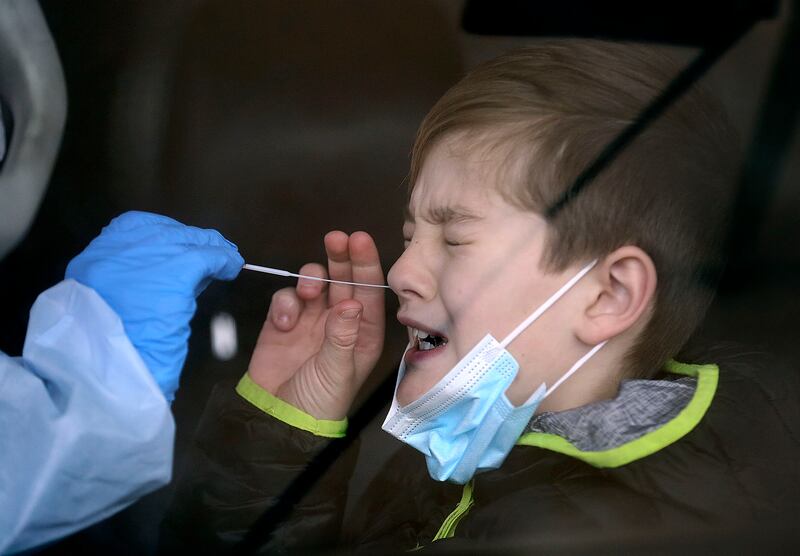Kortnie Aldous, who lost her father last May after both her parents were hospitalized with COVID-19, struggles to understand why some of her fellow Utahns still have little or no worry about catching the deadly virus.
“It honestly makes me sick to my stomach,” the Holladay resident said of a new Deseret News/Hinckley Institute of Politics poll that found 31% of Utahns are very concerned about contracting COVID-19 and 33% are somewhat concerned, but 18% are not very concerned, and 17% are not at all concerned.

“That’s a really scary outlook, to think, ‘It’s not a big deal, it won’t affect me.’ Because you just don’t know. And you don’t know who you’re going to pass it on to. OK, maybe it’s not a big deal if you contract it and you only have a sore throat. But what if you take that home,” she said, to someone more vulnerable.
Her parents. Karen and Ken Kirkman, may have caught the virus during a quick trip together to the grocery store, she said, becoming the first people the family knew to test positive even though they’d been careful to wear masks and social distance.
Her 74-year-old father, who still sold real estate and helped coach his grandson’s youth football team, had to be put on a ventilator and died hours after his high school sweetheart and wife of more than 50 years was released from the hospital.
Aldous, choking back tears, said she told her mother that day, “He just wanted to make sure that you were home and safe, and he felt like he could go.” She said she was the last person to speak to her father before he was put on a ventilator.
“I would never want anyone to go through that. I mean, it was horrific. I would never wish that on anyone,” Aldous said. “So, I hope that as a state, as a community, as a nation, we can come together and get through this, and all do our part, even if it’s something you may not agree with, we’ve all got to do our part to get through this.”
Dr. Eddie Stenehjem, Intermountain Healthcare infectious diseases physician, said the poll results “unfortunately” show that too many Utahns don’t understand the potential impact of getting the virus, apparently believing only those in high-risk categories because of age or underlying health conditions need worry.
With more than a third of Utahns saying they’re minimally if at all concerned about getting the virus, “they don’t understand what can happen when somebody’s infected with COVID-19, not from a personal standpoint but also from a transmission standpoint,” Stenehjem said.
“Everybody should be concerned if they get COVID-19, even if you’re low risk,” the doctor said. “You should be concerned, one, that even if you’re low risk you can have severe, poor outcomes. And two, if you’re low risk you can transmit that virus to people that are at high risk and those people do poorly.”
Utahns may improve their understanding as more and more are struck by the virus. A new variant that is considered at least 50% more contagious has now been detected in the state, which has already seen more 333,000 cases and close to 1,600 deaths.
“Once you’ve been impacted personally by COVID, you do understand how severe this infection can be, regardless of whether you’re hospitalized or not,” Stenehjem said, adding many people have suffered through severe symptoms for weeks at home.
A whopping 94% of Utahns polled said they know someone who’s had COVID-19, while 17% know someone who’s been hospitalized with the virus, and 14%, someone who has died from it. Also, about 9 out of 10 Utahns said they typically wear a mask anytime they leave their homes.

The poll, conducted Jan. 12-15 of 1,000 registered Utah voters for the Deseret News and the University of Utah’s Hinckley Institute of Politics by independent pollster Scott Rasmussen, has a margin of error of plus or minus 3.1 percentage points.
Jason Perry, director of the Hinckley Institute of Politics, suggested some of the politicization of the pandemic may be falling away as more Utahns are touched by the virus. The politically charged debate over wearing masks, which became a major issue in the Utah governor’s race, has quieted down, Perry said.
“When people were talking about masks mostly through a purely political lens, not a lot of people knew someone personally who had been diagnosed with COVID-19,” he said. ”But most Utahns now do know someone who has had it and an increasing number have been to the hospital or died,” he said.
That’s also led to a vast majority of Utahns wearing a mask whenever they leave their homes, Perry said.
“The virus doesn’t care about party at all. No matter where you are on the political spectrum, people have been attacked in a personal way by COVID-19,” he said. “That’s not the hypothetical. That’s very real. The virus is real and I think these numbers represent that people recognize that fact.”
Florida-based pollster Rasmussen said the 64% of Utahns who expressed concern about getting COVID-19 is “a pretty high number” but noted only about half of those, 31%, are very concerned. He said it’s hard to know how those less worried actually view the impact of the virus.
“You could be somewhat concerned about it and say, ‘Yeah, you know there’s a good chance I’ll get it, but it’s not that big a deal. So yeah, I’m concerned but it’s not the end of the world,’” he said. “I believe it is safe to say concern about the pandemic, broadly speaking, is something most voters in Utah and throughout the nation feel.”
Aldous, whose family will never be the same, recalled a conversation she had in the hospital with her mother last year about the possibility Utah could reach 60 deaths. Today, with Utah hitting more than 26 times that number, she’s aware some still have “kind of a carefree attitude.”
The reality is Utahns still have to protect each other from the virus, she said, even if they’re weary of the safety measures public health officials continue to call for — wearing masks, social distancing, hand-washing and avoiding gatherings.
“I understand that fatigue. I mean, I feel it myself.” Aldous, an Olympus High School girls soccer coach, said. “So I think if someone who has had my experience feels that fatigue, that we all need to be ultra cautious because this is the time we really need to pay attention.”


